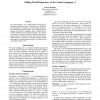Free Online Productivity Tools
i2Speak
i2Symbol
i2OCR
iTex2Img
iWeb2Print
iWeb2Shot
i2Type
iPdf2Split
iPdf2Merge
i2Bopomofo
i2Arabic
i2Style
i2Image
i2PDF
iLatex2Rtf
Sci2ools
124
click to vote
NMR
2004
Springer
2004
Springer
Adding modal operators to the action language A
The action language A is a simple high-level language for describing transition systems. In this paper, we extend the action language A by allowing a unary modal operator in the underlying propositional logic. The extended language requires very little new machinery, and it is suitable for describing transitions between Kripke structures. We consider some formal restrictions on action descriptions that preserve natural classes of Kripke structures, and we prove that the modal epistemic extension of A naturally subsumes related approaches to reasoning about knowledge. We conclude with some plans for future work.
Related Content
| Added | 02 Jul 2010 |
| Updated | 02 Jul 2010 |
| Type | Conference |
| Year | 2004 |
| Where | NMR |
| Authors | Aaron Hunter |
Comments (0)

